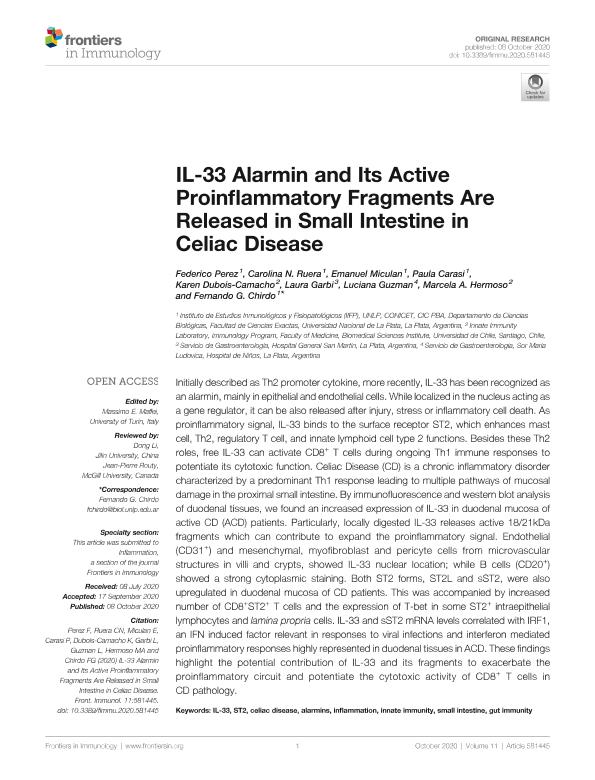Artículo
IL-33 alarmin and its active proinflammatory fragments are released in small intestine in Celiac disease
Perez, Federico ; Ruera, Carolina Naymé
; Ruera, Carolina Naymé ; Miculán, Emanuel Gonzalo
; Miculán, Emanuel Gonzalo ; Carasi, Paula
; Carasi, Paula ; Dubois Camacho, Karen; Garbi, Laura; Guzman, Luciana; Hermoso, Marcela A.; Chirdo, Fernando Gabriel
; Dubois Camacho, Karen; Garbi, Laura; Guzman, Luciana; Hermoso, Marcela A.; Chirdo, Fernando Gabriel
 ; Ruera, Carolina Naymé
; Ruera, Carolina Naymé ; Miculán, Emanuel Gonzalo
; Miculán, Emanuel Gonzalo ; Carasi, Paula
; Carasi, Paula ; Dubois Camacho, Karen; Garbi, Laura; Guzman, Luciana; Hermoso, Marcela A.; Chirdo, Fernando Gabriel
; Dubois Camacho, Karen; Garbi, Laura; Guzman, Luciana; Hermoso, Marcela A.; Chirdo, Fernando Gabriel
Fecha de publicación:
08/10/2020
Editorial:
Frontiers Media
Revista:
Frontiers in Immunology
ISSN:
1664-3224
Idioma:
Inglés
Tipo de recurso:
Artículo publicado
Clasificación temática:
Resumen
Initially described as Th2 promoter cytokine, more recently, IL-33 has been recognized as an alarmin, mainly in epithelial and endothelial cells. While localized in the nucleus acts as a gene regulator, it can be also released after injury, stress or inflammatory cell death. As proinflammatory signal, IL-33 binds to the surface receptor ST2, which enhances mast cell, Th2, regulatory T cell, andinnate lymphoid cell type 2 functions. Besides these Th2 roles, free IL-33 can activate CD8+ T cells during ongoing Th1 immune responses to potentiate its cytotoxic function. Celiac Disease (CD) is a chronic inflammatory disorder characterized by a predominant Th1 response responsible for multiple pathways of mucosal damage in the proximal small intestine. By immunofluorescence and western blot analysis of duodenal tissues, we found an increased expression of IL-33 in duodenal mucosa of active CD (ACD) patients. Particularly, locally digested IL-33 releases active 18/21kDa fragments which can contribute to expand the proinflammatory signal. Endothelial (CD31+) and mesenchymal, myofibroblast and pericytes, cells from microvascular structures in villi and crypts, showed IL-33 nuclear location; while B cells (CD20+) showed a strong cytoplasmic staining.Both ST2 forms, ST2L and sST2, were also upregulated in duodenal mucosa of CD patients. This was accompanied by increased number of CD8+ST2+ T cells and the expression of T-bet in some ST2+ intraepithelial lymphocytes and lamina propria cells. IL-33 and sST2 mRNA levels correlated with IRF1, an IFN induced factor relevant in responses to viral infections and interferon mediatedproinflammatory responses highly represented in duodenal tissues in ACD. These findings highlight the potential contribution of IL-33 and its fragments to exacerbate the proinflammatory circuit and potentiate the cytotoxic activity of CD8+ T cells in CD pathology.
Archivos asociados
Licencia
Identificadores
Colecciones
Articulos(IIFP)
Articulos de INST. DE ESTUDIOS INMUNOLOGICOS Y FISIOPATOLOGICOS
Articulos de INST. DE ESTUDIOS INMUNOLOGICOS Y FISIOPATOLOGICOS
Citación
Perez, Federico; Ruera, Carolina Naymé; Miculán, Emanuel Gonzalo; Carasi, Paula; Dubois Camacho, Karen; et al.; IL-33 alarmin and its active proinflammatory fragments are released in small intestine in Celiac disease; Frontiers Media; Frontiers in Immunology; 11; 8-10-2020; 1-15
Compartir
Altmétricas



